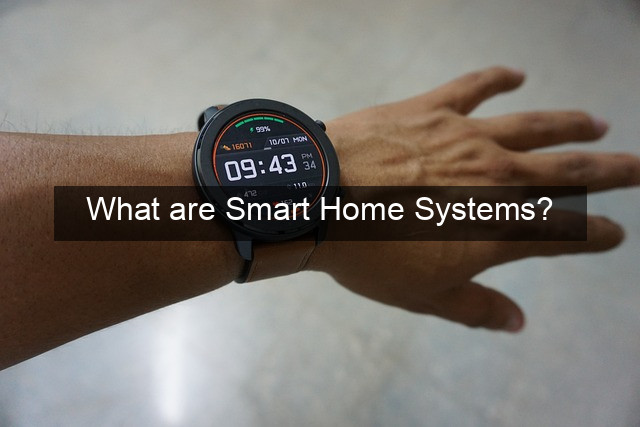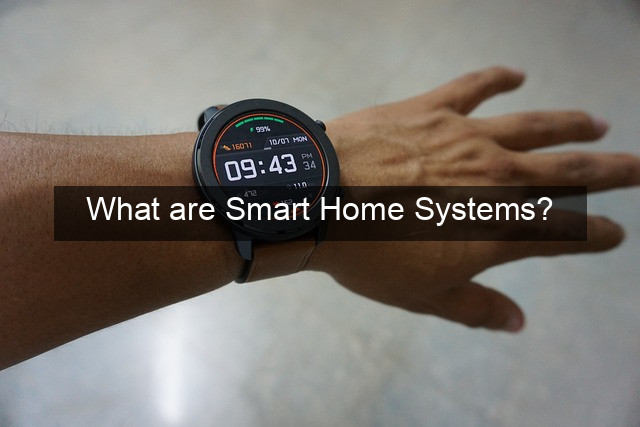What are Smart Home Systems?

- What are Smart Home Systems?
- What are Smart Home Systems?
- Core Components of a Smart Home System
- The Control Hub: The Brain of the Operation
- Smart Devices: The Building Blocks of Automation
- Network Connectivity: The Backbone of the System
- Benefits of Implementing a Smart Home System
- Enhanced Security
- Improved Energy Efficiency
- Increased Convenience and Comfort
- Choosing the Right Smart Home System
- Compatibility
- Scalability
- Budget
- Conclusion

What are Smart Home Systems?
Imagine walking into a home where the lights dim to your preferred setting as you enter, the temperature adjusts to your ideal comfort level, and your favorite playlist starts playing softly in the background. This isn’t a scene from a futuristic movie; it’s the reality offered by smart home systems. These interconnected devices and appliances transform ordinary houses into intelligent, responsive living spaces. From enhancing security and convenience to optimizing energy efficiency, smart home technology offers a wealth of benefits that are rapidly changing the way we live.
Smart home systems, also known as home automation systems, connect various devices and appliances within a home through a central network. This network allows you to control and automate tasks, creating a more comfortable, efficient, and secure environment. The control hub, often a smartphone app or a dedicated device, provides a user-friendly interface to manage everything from lighting and thermostats to security cameras and entertainment systems. This level of integration and automation is what distinguishes a truly smart home from simply having a few connected gadgets.
Core Components of a Smart Home System
The Control Hub: The Brain of the Operation
At the heart of every smart home system lies the control hub. This central device acts as the brain of the operation, connecting and managing all other smart devices. It receives commands, processes them, and sends instructions to the appropriate devices. Control hubs can take various forms, including dedicated hardware devices, smart speakers, or even software applications on your smartphone or tablet.
Choosing the right control hub is crucial for a seamless smart home experience. Consider factors like compatibility with your preferred devices, ease of use, and the level of customization offered. Some hubs specialize in specific ecosystems, while others offer broader compatibility. Researching different options will help you find the best fit for your needs.
The control hub simplifies the management of your smart home by providing a single interface for all your devices. Instead of juggling multiple apps, you can control everything from one central location. This streamlined approach makes automating tasks and creating personalized scenarios much easier.
Smart Devices: The Building Blocks of Automation
Smart home systems are built upon a foundation of smart devices. These interconnected appliances and gadgets range from smart lighting and thermostats to security cameras and entertainment systems. Each device plays a specific role in enhancing convenience, security, or efficiency within the home.
The range of available smart devices is constantly expanding, offering homeowners more options than ever before. Smart lighting allows you to adjust brightness and color remotely, while smart thermostats optimize energy usage by learning your preferences and adjusting temperatures accordingly. Smart security cameras provide peace of mind by monitoring your home and sending alerts in case of suspicious activity.
When choosing smart devices, consider their compatibility with your chosen control hub. Look for devices that offer the features you need and fit within your budget. Start with a few essential devices and gradually expand your system as you become more comfortable with the technology.
Network Connectivity: The Backbone of the System
A reliable network connection is essential for a smoothly functioning smart home system. Devices communicate with each other and the control hub through Wi-Fi, Z-Wave, or Zigbee protocols. A strong and stable network ensures that commands are transmitted quickly and reliably.
Consider the range and bandwidth of your network when adding multiple smart devices. A mesh network can help extend coverage and improve reliability, especially in larger homes. Ensure your router and modem are up to the task of handling the increased traffic from numerous connected devices.
Regularly checking your network’s performance and addressing any connectivity issues will help maintain the optimal performance of your smart home system. A stable network is the backbone of a seamless and responsive smart home experience.
Benefits of Implementing a Smart Home System
Enhanced Security
Smart home systems offer significant improvements in home security. Smart locks eliminate the need for physical keys, allowing you to control access remotely and monitor who enters and exits your home. Integrated security cameras provide real-time surveillance and can send alerts to your smartphone if any unusual activity is detected.
Motion sensors can trigger lights or alarms, deterring potential intruders. The ability to remotely monitor your home provides peace of mind, whether you’re at work, on vacation, or simply away for the evening. You can check in on your property anytime, anywhere, and receive immediate notifications if something goes wrong.
The increased security offered by smart home systems can also lead to lower insurance premiums. Many insurance providers offer discounts for homes equipped with smart security features, recognizing the reduced risk of theft or damage.
Improved Energy Efficiency
Optimizing energy consumption is another key benefit of smart home systems. Smart thermostats learn your temperature preferences and adjust heating and cooling accordingly, reducing energy waste. Smart lighting allows you to control lights remotely, ensuring that lights are turned off when not in use.
Smart appliances, such as refrigerators and washing machines, can be programmed to operate during off-peak hours, further reducing energy costs. By automating energy management, you can significantly lower your utility bills and reduce your environmental footprint.

The data collected by smart devices can provide valuable insights into your energy usage patterns. This information can help you identify areas where you can further optimize energy consumption and save even more money.
Increased Convenience and Comfort
Smart home systems bring unparalleled convenience to everyday life. Automating tasks like adjusting lighting, controlling temperature, and managing entertainment systems simplifies your daily routine and frees up your time.
Voice control allows you to manage your devices hands-free, simply by speaking commands. You can adjust the thermostat, play music, or dim the lights without lifting a finger. This level of automation creates a more comfortable and relaxing living environment.
Personalized scenarios can be created to automate multiple tasks simultaneously. For example, a “good morning” scenario could automatically turn on the lights, adjust the thermostat, and start brewing coffee when you wake up. These customizable scenarios tailor your home to your specific needs and preferences.
Choosing the Right Smart Home System
Compatibility
When selecting a smart home system, consider the compatibility of different devices. Ensure that the control hub you choose supports the devices you want to integrate. Some systems are designed for specific ecosystems, while others offer broader compatibility.
Researching different platforms and protocols will help you make an informed decision. Consider factors like the number of devices you plan to connect, the types of devices you want to use, and the level of customization you require.
Choosing a system with broad compatibility allows you to mix and match devices from different manufacturers, giving you more flexibility and choice.
Scalability
Think about the future when choosing a smart home system. Select a system that can scale with your needs. You may start with a few basic devices, but you may want to add more in the future.
A scalable system allows you to easily integrate new devices as they become available. This ensures that your system can grow and adapt to your changing needs over time.
Consider the potential for future upgrades and expansions when making your initial investment. Choosing a scalable system will save you money and hassle in the long run.
Budget
Smart home systems can range in price from a few hundred dollars to several thousand. Set a budget before you start shopping and stick to it. Consider the cost of the control hub, the price of individual devices, and any ongoing subscription fees.
Start with a few essential devices and gradually expand your system as your budget allows. There’s no need to invest in everything at once. You can build your smart home over time, adding new devices as you need them.
Researching different brands and models will help you find the best value for your money. Compare features, prices, and reviews to make informed decisions about your purchases.
| Feature | Benefit |
|---|---|
| Remote Access | Control your home from anywhere |
| Automation | Simplify daily tasks |
| Security | Protect your home and family |
| Energy Efficiency | Reduce utility bills |
- Smart Lighting
- Smart Thermostats
- Smart Security Cameras
- Smart Appliances
Conclusion
Smart home systems offer a transformative approach to modern living. By integrating and automating various devices, these systems enhance security, improve energy efficiency, and increase convenience. From controlling lighting and temperature to managing security and entertainment, smart home technology empowers homeowners to create a more comfortable, secure, and efficient living environment.
As technology continues to advance, the




